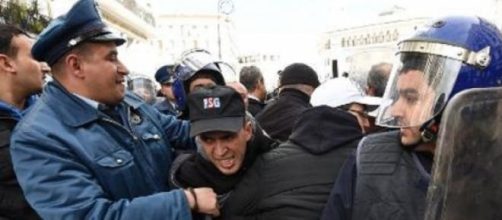New anti-shale gas demonstrations were held this Monday in Algeria, after the violent clashes between protesters and security forces, the authorities showing their determination to put an end to two months of protest.
Southern Algeria has become the scene of a daily demonstration of opponents to the extraction of shale gas by hydraulic fracturing, which they fear the environmental impact of, and these gatherings have become increasingly tense: on Sunday, 40 police officers were injured, two seriously, in In Salah, 200km south of Algiers.
"The town of In Salah has experienced incidents of public order, initiated by a group of young contesting the exploration of shale gas operations in this region," said the Ministry of the Interior.
The clashes erupted when security forces arrived in numbers, and began to dislodge protesters occupying a public square for two months, calling for a moratorium of President Abdelaziz Bouteflika on the exploitation of shale gas.
The opponents in particular fear hydraulic fracturing, which involves creating underground cracks and the infiltration of a mixture of water, sand and chemicals products to allow the extraction of gas captured in the rock, and the potential for polluting the waters of the Saharan basement as a result.
According to press reports, dozens of protesters were injured and the police station and the headquarters of the sub-prefecture and the residence of the sub-prefect were burned.
On Monday morning, hundreds of people have taken possession of the place called Somoud.
At the same time in the National Assembly, members of the opposition expressed dissatisfaction in the Chamber brandishing placards proclaiming "No to shale gas" or "we are all with In Salah."
"The government knows how to organize the exploitation of natural resources to spur economic development for the benefit of the population," replied the President of the Assembly Abdelkader Bensalah, denouncing "agitation" in In Salah.
Algeria relies heavily on its shale gas resources - the fourth highest in the world, according to several studies - to compensate for the drop in oil prices, which represents 95% of its revenue in foreign currency.
However, from the end of December to drill pilot Ahnet near In-Salah, demonstrations broke out before spreading to other provinces of the vast Algerian Sahara. Public company Sonatrach, which operates with Western partners like Anadarko (USA), ENI (Italy), Shell (Anglo-Dutch) or BP (UK), announced in early February that it was continuing its drilling.
In an attempt to counter the unprecedented wave of protest that has taken hold in southern Algeria, the usually peaceful provinces, President Bouteflika has sent many delegations responsible for reassuring people.
Bouteflika himself played on the religious fibre of Algerians. "The oil, conventional gas and shale, renewable energies are gifts from God.
Our responsibility is to grow them and benefit for ourselves and for future generations, "he said on February 24th, when the security forces prevented opposition protests in Algiers.
The intervention of the security forces in the capital and then in In Salah "illustrates the transformation of the regime itself to a real source of threats to the stability, unity and cohesion of the national state," denounced former Prime Minister Ali Benflis, as he became one of the main opponents of Bouteflika.
The party Jil Jadid (New Generation) denounced an escalation of "repression" of power that puts the security institutions "at the disposal of the multinationals."
In addition, the sociologist Nacer Djabi, quoted by El-Khabar, said fear "the worst" in In Salah, where, according to him, the government is "deaf ears"....

